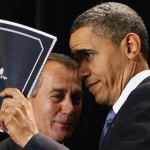Do We Really Have a Civility Shortage?
 The latest D.C. buzzword is "civility" -- but maybe its time Washington stopped worrying about civility and started working on policy.
The latest D.C. buzzword is "civility" -- but maybe its time Washington stopped worrying about civility and started working on policy.
"Civility" now tops the charts as the word of the year in Washington, D.C.
Its ascendance owes much to the media coverage of Congress and its "relationship" to the White House the past two years.
Accordingly, we can read blogs, newspapers, and magazines like The Economist, all urging a "return to civility" in American politics. Senators intone about how the filibuster has ruined the civil dialogue of the Senate. The House decided that members of the two parties would sit next to each other during the State of the Union. Clearly, one might gather, America faces a civil breakdown of high order, if all the anguish represents anything.
From what planet did these folks come?
Riots plague France over pensions, Great Britain over tuition increases, Iraq over religion, Egypt over power, Tunisia over economics, and Greece and almost every nation in Africa over almost everything… yet, the Western media have the time to lament a lack of civility in American politics.
An observation of the past four decades reveals a few important points:
a. Few nations fight as noisily and politically over tinier basic differences as America does.
b. As a corollary, the philosophical differences between politicians in America occupy a very narrow spectrum of differences compared to political divergences in other nations.
c. It is this very narrow range of our views, indeed, that causes the uproar -- everyone is trying to pretend that he (or she) deserves election because of "stark differences" between them and their opponent.
d. "Stark differences" usually mean such trivialities as 10 per cent more education spending through Pell Grants than through students loans, or 3,000 more acres of wilderness versus 10,000 more acres.
e. On the big subjects -- capitalism, free education for all, equality along gender, race, and religious lines, aid to the poor, support for research into medicine and physics and math, and a progressive tax system -- about 95 per cent of members of Congress agree with each other.
f. But, in a world with a 24-hour media starved for "news," people get attention almost always only to the extent that they represent idiosyncrasies or exaggerations.
g. If one wishes to see "uncivil" debate, or no debate at all, go almost anywhere else on the globe.
Of the 6 billion or so folks on earth, it is much less than a billion that enjoy such common civilities as Americans do. And those very civilities carry over, for the most part, into political debate.
Yes, we have the tragedy of disturbed people carrying out horrendous crimes, although very rarely in the name of national politics. What we don't have is troops in city streets, government crackdowns on communications, and forced movement of whole peoples (in the names of such things as new dams) tribal disputes, or an entire gender that faces severe restrictions - and sometimes mutilation - in the name of traditional culture.
My suggestion: stop worrying about the civility of political debate in America and start working on job creation and the soaring and potentially disastrous federal debt. I suspect that both those agenda items would be in better shape if, in the past, our congressional debates had been, indeed, less civil.